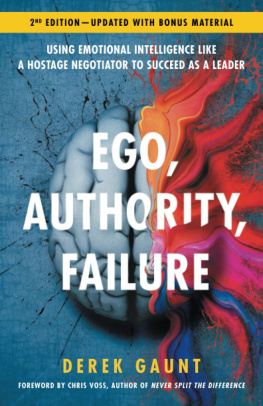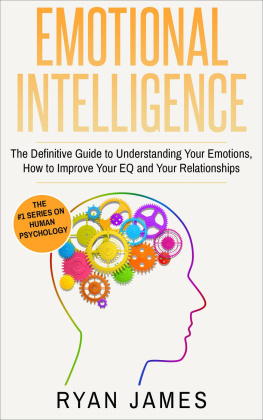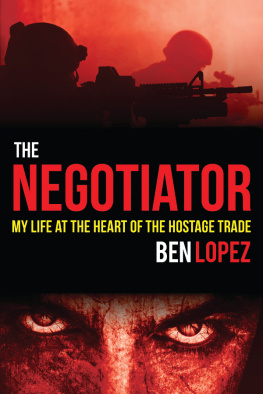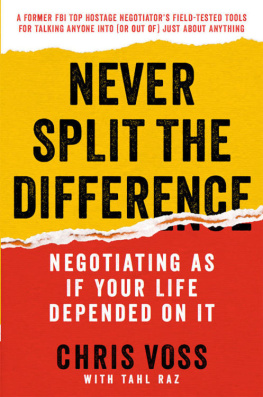Derek Gaunt - Ego, Authority, Failure: Using Emotional Intelligence Like a Hostage Negotiator to Succeed as a Leader - 2nd Edition
Here you can read online Derek Gaunt - Ego, Authority, Failure: Using Emotional Intelligence Like a Hostage Negotiator to Succeed as a Leader - 2nd Edition full text of the book (entire story) in english for free. Download pdf and epub, get meaning, cover and reviews about this ebook. year: 2022, publisher: Derek Gaunt, genre: Business. Description of the work, (preface) as well as reviews are available. Best literature library LitArk.com created for fans of good reading and offers a wide selection of genres:
Romance novel
Science fiction
Adventure
Detective
Science
History
Home and family
Prose
Art
Politics
Computer
Non-fiction
Religion
Business
Children
Humor
Choose a favorite category and find really read worthwhile books. Enjoy immersion in the world of imagination, feel the emotions of the characters or learn something new for yourself, make an fascinating discovery.
- Book:Ego, Authority, Failure: Using Emotional Intelligence Like a Hostage Negotiator to Succeed as a Leader - 2nd Edition
- Author:
- Publisher:Derek Gaunt
- Genre:
- Year:2022
- Rating:5 / 5
- Favourites:Add to favourites
- Your mark:
- 100
- 1
- 2
- 3
- 4
- 5
Ego, Authority, Failure: Using Emotional Intelligence Like a Hostage Negotiator to Succeed as a Leader - 2nd Edition: summary, description and annotation
We offer to read an annotation, description, summary or preface (depends on what the author of the book "Ego, Authority, Failure: Using Emotional Intelligence Like a Hostage Negotiator to Succeed as a Leader - 2nd Edition" wrote himself). If you haven't found the necessary information about the book — write in the comments, we will try to find it.
Derek Gaunt: author's other books
Who wrote Ego, Authority, Failure: Using Emotional Intelligence Like a Hostage Negotiator to Succeed as a Leader - 2nd Edition? Find out the surname, the name of the author of the book and a list of all author's works by series.
Ego, Authority, Failure: Using Emotional Intelligence Like a Hostage Negotiator to Succeed as a Leader - 2nd Edition — read online for free the complete book (whole text) full work
Below is the text of the book, divided by pages. System saving the place of the last page read, allows you to conveniently read the book "Ego, Authority, Failure: Using Emotional Intelligence Like a Hostage Negotiator to Succeed as a Leader - 2nd Edition" online for free, without having to search again every time where you left off. Put a bookmark, and you can go to the page where you finished reading at any time.
Font size:
Interval:
Bookmark:

Copyright 2022 Derek Gaunt
Ego, Authority, Failure: Using Emotional Intelligence like a Hostage Negotiator to Succeed as a Leader
All rights reserved.
Hardcover ISBN: 978-1-5445-2686-7
Paperback ISBN: 978-1-5445-2684-3
eBook ISBN: 978-1-5445-2685-0
One of the deepest principles about life and leadership: its not about you.
Ken Blanchard
This book is dedicated to all the people who have the courage to make themselves better and to all toxic leaders. Read and heed. You are doing more damage than you know.
In the very early days of our negotiation consulting company, the Black Swan Group, we were teaching a block of negotiation instruction within a leadership course being held in Germany. The attendees were members of the China Development Bank.
For an upcoming course that was only a couple of weeks away, I had a conflict, so I advised our German host that I had a substitute, Derek Gaunt, who was more qualified than me and a great lecturer. Andreas, our host, said, Fine. I am sure if you recommend him, he is excellent.
Up to that point I had been one of Andreass highest-rated instructors. He had been very pleased with my contribution and trusted me.
How many times has he taught this course? Andreas asked.
My reply? Never.
Never? Andreass voice shot up about two octaves. He sounded like a teenage boy whose voice was just beginning to change.
Andreas was in a bind. We were just too close to the course date for him to conduct an entirely new search for someone else.
Can I at least talk to him first? Andreas pleaded.
Sure, I said, and we set it up.
The conversation between Andreas and Derek went well enough that it adequately soothed Andreass fears, and Derek went out and taught the course.
The next time Andreas called me for his course, he said, Hey, you are busy again, right? You have got to send Derek again, right?
I was one of Andreass highest-rated instructorsuntil Derek became the highest-rated instructor ever. Andreas told me that on a five-point scale, Derek was the only one ever rated a straight five. And the members of the China Development Bank were the toughest raters he had had.
To make things even worse (for my ego), Derek and I were later discussing the training, and he said, Man, going to that graduation dinner is tough! Those guys drink and toast like nobody I ever saw, and they expect you to keep up with them! How did you handle it?
I said, I did not. They never invited me to the dinner.
Derek Gaunt knows about leadership. Derek Gaunt knows about hostage negotiations. He teaches them both exceptionally. In Ego, Authority, Failure he marries both disciplines to provide cautionary tales and actionable skills to improve leadership performance.
I wrote about Derek in the acknowledgments section of my book Never Split the Difference: Negotiating as If Your Life Depended on It. Derek has been a great wingman and a great friend since I first arrived in the Washington, DC, area two decades ago.
Derek became one of the most important hostage negotiators in the Washington metropolitan area. And that includes local, state, and federal agencies.
He founded or co-founded two different regional hostage negotiation associations that everyone in the DC metro area who wanted to get better at their job attended. Everyone knew him, and when important issues came up that affected the profession, everyone wanted to know what Derek thought.
He personally organized multiagency exercises that hostage negotiators from state, local, and federal agencies attended. He organized weeklong training courses that everyone attended. Even SWAT guys and the regional SWAT association supported Derek.
The hostage negotiators on his team at the Alexandria (Virginia) Police Department (and later the Alexandria Sheriffs Office) were top notch and knew it was because of Dereks leadership and dedication to both them and their craft.
Across the board, he is that good. It is my privilege to know him.
Read this book.
I began my law enforcement career in 1988. After two years as a patrol officer, I was selected to join an elite, plain-clothes, street-level narcotics unit. My job was to enforce narcotics violations and the accompanying nuisance-related crimes. At the time we were known as the jump-out based on the way we conducted our enforcement.
Seemingly out of nowhere, we would arrive on the scene of a street-level narcotics transaction, jump out of our rental cars, and effect the arrest. Then we would just as quickly leave the scene. To a bystander, it looked like a kidnapping. In fact, many bystanders called 911 to report just that when we were making an arrest.
After the arrest, the dealers and buyers would often look for a way out of their charges by cooperating with us, providing information on other dealers or buyers. Sometimes they provided information on more serious crimes.
In these instances, I began to hone my interview and interrogation skills.
I learned if I could say the right thing in the right way, I could elicit a specific response. I was hooked. I wanted to learn more. I attended a Wicklander-Zulawski interrogation class. I was also trained in the Reid Technique of Interrogation and was especially interested in the psychology behind using empathy to uncover information without the bad guy knowing what I was doing. It was a rush. I knew I wanted more. I wanted to be a detective.
In 1994 I got my chance.
When I was a detective, a significant part of my job was to try to get information from people who fell into one of three categories:
1. They did not want to provide information that would expose them any further to the criminal justice system.
2. They were traumatized by the event.
3. They were afraid of the repercussions if someone found out they had given information to the police.
Each of the categories required rapport building to allay their concerns and gain their trust so they would willingly provide the information. Building rapport and gathering information was the way to go. I learned this long before the post-9/11 studies on detainee interrogation, one of which stated, Detainees were fourteen times more likely to disclose information earlier in an interview when the interviewer used rapport-building strategies.
After a few years of this, I wanted to take this passion to the next level as a hostage negotiator. Many of the negotiators on the team were detectives, which supported the idea that similar skillsets were found in both disciplines.
In 1997, I competed for and was selected to fill one of five spots on our Hostage Negotiation Team (HNT). Immediately I became a student of the game. I immersed myself in everything related to empathy, interpersonal communication, and hostage/barricade management. I was promoted through the ranks, becoming team supervisor in 2001 and then team commander in 2004, a position I held until my retirement in 2014.
I saw a lot, did a lot, and learned a lot about human nature, psychology, emotion, and communication. Over the years, I saw firsthand how important it is to calibrate communication to de-escalate emotional responses and turn negative situations into positives so people can return to, as the FBIs Crisis Negotiations Unit puts it, the NFLthe normal functioning level.
Font size:
Interval:
Bookmark:
Similar books «Ego, Authority, Failure: Using Emotional Intelligence Like a Hostage Negotiator to Succeed as a Leader - 2nd Edition»
Look at similar books to Ego, Authority, Failure: Using Emotional Intelligence Like a Hostage Negotiator to Succeed as a Leader - 2nd Edition. We have selected literature similar in name and meaning in the hope of providing readers with more options to find new, interesting, not yet read works.
Discussion, reviews of the book Ego, Authority, Failure: Using Emotional Intelligence Like a Hostage Negotiator to Succeed as a Leader - 2nd Edition and just readers' own opinions. Leave your comments, write what you think about the work, its meaning or the main characters. Specify what exactly you liked and what you didn't like, and why you think so.






